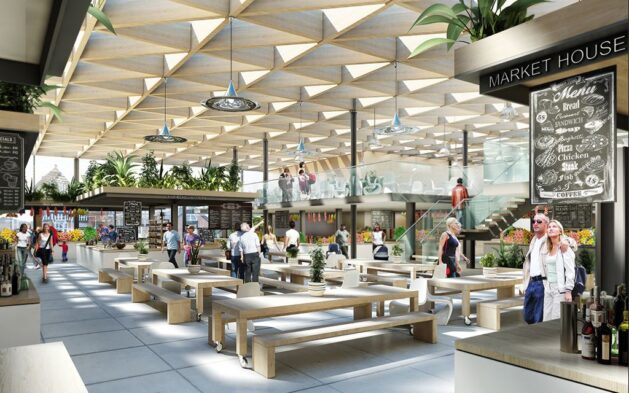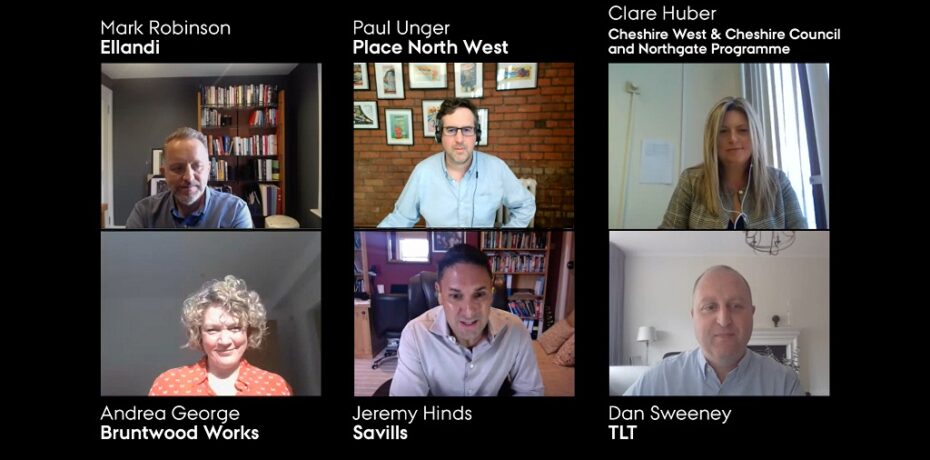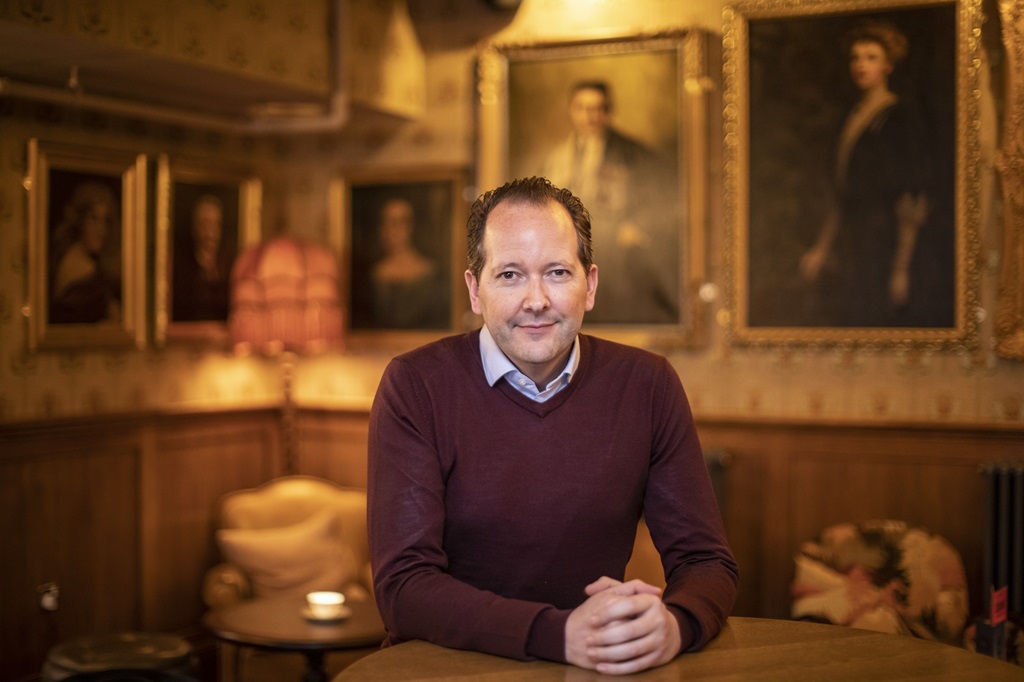Event Summary
Future of Retail + Leisure | Summary
The challenging retail environment was a hot topic even before the pandemic, and varying degrees of lockdown have done nothing to ease the problems the sector faces, delegates at a Place North West event heard.
The Future of Retail + Leisure was sponsored by TLT, Savills, Bruntwood Works and ISG and hosted by Place North West publisher Paul Unger.
This was the latest event under Place North West’s new conference format, using a platform called Remo that enables networking on digital ‘tables’, as well as many other features.
Full video recording of the event is available here.

Key questions
- Are policy makers taking seriously the concept of the ’20-minute city’?
- Would it be realistic to permanently make city centre areas car-free, as we’ve seen during the pandemic?
- What’s the outlook for the restaurant sector after the furlough and Eat Out to Help Out schemes end?
Main takeaways
- An emerging trend towards repurposing retail properties needs to be accelerated, with proactive councils leading the way in bringing back civic uses and more localised retail.
- Although there are concerns for restaurants and bars, continuing with car-free zones will support them and other city centre businesses.
- Consultation processes must be wider, with parties making a genuine effort to reach a broader set of social and age groups.
Panel 1 – The future of town centres
Mark Robinson, co-founder of Ellandi, and chair of the High Streets Task Force
Andrea George, regional director – town centres and consumer brands, Bruntwood Works
Jeremy Hinds, director, Savills
Dan Sweeney, partner, TLT
Clare Huber, senior manager of construction, regeneration major projects and markets, Cheshire West & Cheshire Council, and the Chester Northgate programme
Presenting on the Government’s High Streets Task Force, Mark Robinson said: “The task force is a child of the Timpson Review and the £750m Future High Streets Fund announced in August 2019. The aim is to corral the efforts of talented people with a stake in placemaking. From Ellandi’s work in Ashton-under-Lyne, Bootle, Chester and Middleton, we’ve seen the need for proactive local authorities, [repurposing] retail space, community use and adoption of Big Data.”
Meanwhile, the subsequent panel session explored prospects for town centres. A picture emerged that might surprise some: the Covid crisis and reduction in “leisure” shopping has seen outlying town centres outperform the big cities.
Robinson said the next 10 years will likely be the most exciting time to be in development and place transformation in years: “Lord Kerslake has likened it to the €1.8trn German reunification,” he said.
Public-private collaboration will be key, he added, and the Government needs to nurture an environment that “allows us to build on what retail’s really worth. If retail is going to be worth less – and retail property was far too successful and forced out other uses, but we now need to get residential, civic, leisure, healthcare back into town centres – it might look like it did 100 years ago”.
Andrea George spoke about Bruntwood Works’ experiences in Stretford, where it is working with Trafford Council to reimagine the town centre. “We decided to take a step back with consultation and ask ‘what is it you want?’ as a starting point, which met with surprise [among the local community]. We were stress-testing the strategy. It’s a different time, and we need to understand the needs we’re responding to. We’ve had nearly 20,000 page views.
“The rise in working from home has been a boost for town centres, and we may see companies downsize central space to use co-working pop-ups and flexible spaces. It plays in with re-finding our way as consumers. One issue is understanding what younger people want, because it’s theirs in future.
Clare Huber said “We’re on site now with Northgate after holding our biggest ever consultation to shape what is now being built. There’s a focus on leisure and infrastructure. You have to be imaginative with consultation to go beyond the ‘usual suspects’ who are already engaged.
“There’s definitely a future for our market towns – we’re going to have to work in partnership, and get communities involved early, because taking action quickly can be difficult. But Covid has shown that there’s a need for retail operators that have lost out to [nearby out-of-town retail park] Cheshire Oaks.”

A market building forms part of the council’s plans for Chester Northgate
Dan Sweeney said there needs to be a serious re-think around insolvency tools, the valuation of retail and leisure assets and the landlord/tenant relationship. He said: “We’ve talked a lot about a more collaborative approach, but the sense in general is that there’s uncertainty due to insolvency positions and rental expectations.”
Sweeney added that there are occupiers being acquisitive, for instance in roadside retail, and he pointed to the Co-op’s surge on the back of more localised shopping.
According to Jeremy Hinds, the industry has to work from a position of assuming that the “likes of Next aren’t going to occupy 360 UK stores any longer”.
He said: “We’re lacking a dialogue for what alternative uses might be, how we engage with the public, how we make centres attractive.
“One issue is that we’ve lost sight of social value or capital, we don’t have a mechanism to understand what a library, public park, church or school is worth. Without that it’s difficult for people to understand ‘total’ value of towns.”
Panel 2 – Placemaking
Richard Land, director, Therme Group
Andy Roberts, director, Planit-IE
Lucy Noone Blake, hospitality consultant, Pear
Jennina O’Neill, centre manager, Metquarter and chair of Retail + Leisure at Liverpool BID Company
Andy Roberts presented on the concept of the ’20-minute’ neighbourhood. He said: “Covid has seen the 20-minute neighbourhood idea come to prominence – that is, everything you need within walking distance: green space, work, shopping, connectivity. Cities need bold moves to humanise infrastructure: everyone’s been wowed by images of [Manchester’s] car-free Northern Quarter, and we’ve progressed by reducing scale on British Land’s refused scheme in Lancaster.”
Roberts said that “some do get the 20-minute city as a sustainable model of development, but unfortunately it’s not widespread yet. [Its take0up] needs to be driven by public sector, although some areas will struggle with viability”.
Roberts also touched on Altrincham’s connectivity strategy as an exemplar of compromise. “We’ve allowed vehicular penetration in certain locations, you can humanise streetscapes with controlled car use – low speeds and so on. We can’t go back to increased car usage.”
He accepted that there would be “plenty of calls on Government money” to compete with, but that councils could explore sales of public land to fund essential infrastructure. He also pleaded for boldness when it comes to repurposing vacant units. “Offer them for free for start-ups, university leavers – it’s low-risk.”
Richard Land, whose firm is leading the £250m plans for a leisure resort in Trafford Park, said that with the Metrolink, the resort would fit into the 20-miute neighbourhood model. Successful in Germany, expectations are high for the maiden UK venture.
He said: “Our latest facility in Bucharest proves the international model, with 1.3 million people from a catchment of four million within a 90-minute drive time. Manchester, we all know, is becoming a mega-city. We feel certain and confident of it.
“We’re keen to link with the cycleways, and bleed green into neigbourhoods – everyone has that responsibility to open up neighbourhoods. We focus on wellbeing and part of our turnover is F&B, developing an exciting concept. I think there’ll be a focus on urban wellbeing now.”

Therme Group is progressing a £250m leisure and wellness resort in Trafford Park
For Janine O’Neill, Liverpool’s Metquarter was ahead of the curve in repurposing retail space, welcoming a media academy, cinema and more F&B provision.
She also represents Liverpool BID (business improvement district), and said the city’s footfall had remained stable at one million people a week. Although down on 2019 levels, the figure outperforms most cities. Despite a reduction in international visits, the city has seen increases in day and overnight visits and feels bustling.
O’Neill said she believes there are deals out there for out-of-town staples: bowling alleys, trampoline parks. “These things add to the ‘day out’ experience.”
She also said there’s a groundswell of opinion against bringing back cars to areas of Liverpool that were pedestrianised this summer, such as Bold Street and Castle Street. The other upside of the Covid lockdown, she said, is that necessity has driven greater collaboration between parties that might not otherwise meet, such as independents and the operators of the Liverpool One retail complex. “We can work together and be a more collaborative city now.”
Lucy Noone-Blake said the Native hotel space close to Manchester Piccadilly has “inadvertently” become a co-working space as it tries to assign a “work value” to seats, overcoming the modern problem of low-paying customers lingering there for long periods of time. “It’s a massive, airy space, and it’s been a massive success.”
Government messaging was also criticised by panellists during the event. Noone-Blake said: “Local lockdowns are making it incredibly difficult for restaurants to make plans. With things constantly being reviewed, if rules are announced at 10pm, it’s hard to work with. We keep hearing of city centres dying, and the restaurants will be first to go, because lots are barely existing.”
She concluded: “There’s an opportunity for landlords to rip up old ways of doing things. With greater [media] coverage of restaurants, people might understand how hard it is to make a profit and hopefully collaboration will improve in the hospitality sphere.
“There’s an awful lot of talent being released in hospitality, and that knowledge is there waiting to be harnessed by landlords that want to put it to use.”
The next Place North West event is the Manchester Offices + Workspace Update on Thursday 1 October. Click here for further details.




